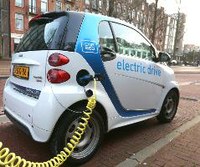(BRUSSELS) – The EU Commission claimed progress Monday in efforts to establish the EU as a lead player in battery innovation and manufacturing, as it struggles to catch up with China with plans for clean energy transition.
One year on from the launch of the European Battery Alliance (EBA), the Commission’s vice-president for energy union Maros Sefcovic hosted a high-level meeting with EU Member States and CEOs to present main achievements, including the building of first pilot production facilities and to announce further projects.
Batteries are seen as as essential to the automotive industry of the 21st century, and Brussels is eager that the EU should “maintain its leadership in the automotive sector, but also in clean energy systems, it has to have independent capacity to develop and produce batteries”.
“I am proud to see the traction created by the European Battery Alliance,” said Mr Sefcovic: “As we mark its first year anniversary, we can show how the various pieces of puzzle are coming together thanks to our collaborative work with the European Investment Bank, several governments and the industry.”
Internal Market Commissioner Elzbieta Bienkowska added: “A strong battery industry is a perfect fit for our ambition to promote clean mobility. E-cars are the standard example, but we’re also already thinking about how the battery alliance could be useful for trucks, sea shipping and ferries.”
For Europe, battery production is a strategic imperative for clean energy transition and the modernisation and competitiveness of its industry, including the automotive sector.
This will, at the same time, be providing a boost to jobs and growth, stimulate research and innovation and prepare the European industry to support climate commitments set by the EU to tackle climate change also in the context of the Paris Agreement.
Moreover, the Commission’s “New Industrial Policy Strategy” goal is to make the EU the world leader in innovation, digitisation and decarbonisation.
The Strategic Action Plan for Batteries covered all the activities which can help Member States, regions and European industry establish competitive, innovative and sustainable battery manufacturing projects in the EU. These include measures on the access to raw materials, research and innovation, skills, the regulatory framework that will ensure that the batteries placed on the market are not only competitive, high quality and safe but also sustainable and recyclable. The Action Plan was built on discussions with key industrial stakeholders, interested Member States and the European Investment Bank.
According to available forecasts, the battery market could be worth of 250 billion a year from 2025 onwards. To cover the EU demand alone, it requires a conservative estimate of at least 20 ‘gigafactories’ (large-scale battery cell production facilities) established in Europe. The scale and speed of the necessary investment require a combined effort to address this industrial challenge.
The European Battery Alliance was launched by Mr Sefcovic with Member States and industry in October 2017. This cooperative platform now gathers the European Commission, interested EU countries, the European Investment Bank and over 260 industrial and innovation stakeholders. The objective is to create a competitive, innovative and sustainable value chain in Europe with sustainable battery cells at its core.
European Battery Alliance - background guide
Strategic Action Plan for Batteries - background guide


